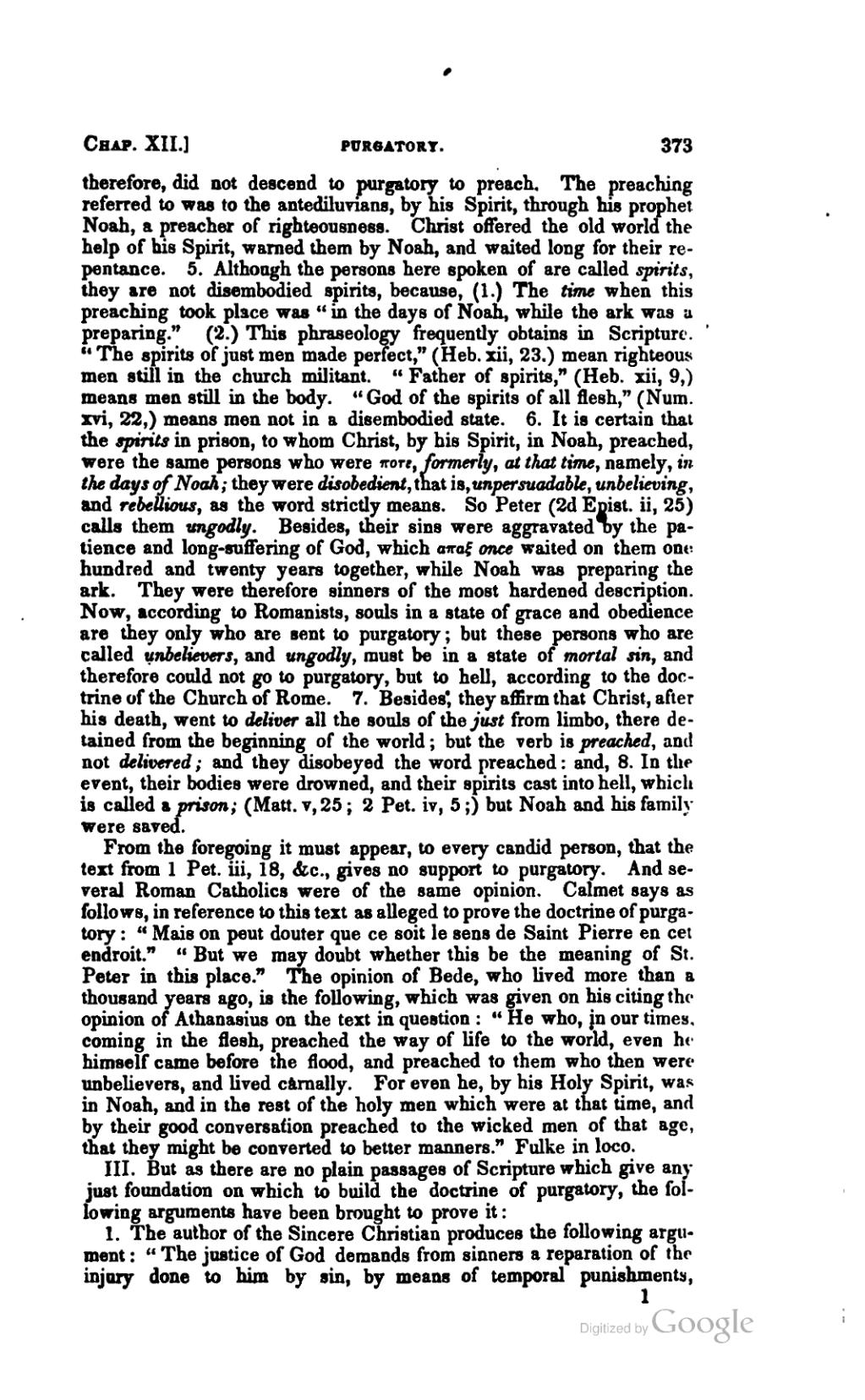CHAP. XII.] PVaO'?oaY. therefore, d/d not descend to }?urgatory to preach. The preaching referred to was to the antediluwans, by his Spirit, through his prophet. Noah, a preacher of righteousness. Christ offered the old world the help of his Spirit, warned them by Noah, and waited long for their re- penrance. 5. Althongh the persons here spoken of are called they are not disembodied spirits, because, (1.) The t/m? when this preaching took place was "in the days of Noah, while the ark was preparing." (2.) This phraseology frequenfiy obtains in Scripture. "The spirits of just men made perfect," (Heb. xii, 23.) mean righteous men still in the church militant. "Father of spirits,"(Heb. xii, 9,) means men still in the body. "God of the spirits of all flesh," (Num. xvi, 22,) means men not in a disembodied state. 6. It is certain that the ??/r/ts in prison, to whom Christ, by his Spirit, in Noah, preached, were the same persons who were ,or?, formerly, at tl?t time, namely, t? days of Noah; they were d/sobed/ent, that is,unpersuadable, unbelieving, and rebdlious, as the word stricdy means. So Peter (2d EDist. ii, 25) calls them ungodly. Besides, their sins were aggravated*by the pa- tience and long-suffering of God, which a?ra? trace waited on them ont., hundred and twenty years together, while Noah was preparing the ark. They were therefore sinners of the most hardened description. Now, according to Romanists, souls in a state of grace and obedience are they only who are sent to purgatory; but these persons who are called .unbelievers, and ungodly, must be in a state of mortal sin, and therefore could not go to purgatory, but to hell, according to the doc- trine of the Church of Rome. 7. Besides? they affirm that Christ, after his death, went to ddiv all the souls of the just from limbo, there de- tained from the beginning of the world; but the verb is preac/?d, anti not ddivered; and they disobeyed the word preached: and, 8. In the event, their bodies were drowned, and their spirits cast into hell, which is called a pr/?on; (Matt. v, 25; 2 Pet. iv, 5 ;) but Noah and his family were saved. From the foregoing it must appear, to every candid person, that the text from 1 Pet. ili, 18, &c., gives no support to purgatory. And se- veral Roman Catholics were of the same opinion. Calmet says as follows, in reference to this text as alleged to prove the doctrine of purga- tory: "Mais on peut douter que ce soit ]e sons de Saint Pierre encet endreit." "But we may doubt whether this be the meaning of St. Peter in this place." The opinion of Bede, who lived more than a thousand years ago, is the following, which was given on his citing tht. opinion of Athanasius on the text in question: "He who, jn our times. coming in the flesh, preached the way of life to the world, even himself came before the flood, and preached to them who then were unbelievers, and lived c?rnally. For even he, by his Hol? Spirit, was in Noah, and in the rest of the holy men which were at that time, and by their good conversation preached to the wicked men of that age, that they might be converted to better manners." Fulke in 1oco. lII. But as there are no plain passages of Scripture which give any just foundation on which to build the doctrine of purgatory, the fol- lowing arguments have been brought to prove it: 1. The author of the Sincere Christian produces the following argu- ment: "The justice of God demands from sinners a reparation of the injury done to him by sin, by means of temporal punishments, 1
�
